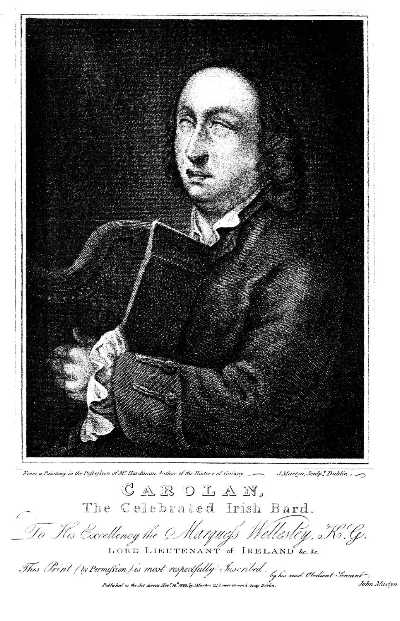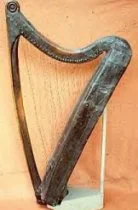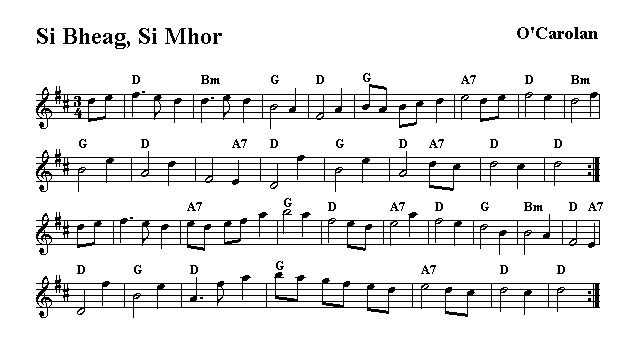
Sí Bheag, Sí Mhór (Irish Gaelic for ‘big fairy, little fairy’) was the first song written for the harp by the great Turlough O’Carolan (1670-1738). It describes the battle between the queens of the Big Fairy Hill (Sí Mhór) and the Little Fairy Hill (Sí Bheag), and apparently refers to a site in Co. Meath where ‘two battling giants were turned by a wizard into two hills’
O’Carolan was the last of the great Gaelic bards, and is rightfully seen as one of Ireland’s great composers. Born to an Iron Founder, O’Carolan became blind from the smallpox at the age of 18. His illness could have ruined him, were it not for the discerning eye of the wife of his Father’s employer, one Mrs. MacDermott-Roe, who supported his being apprenticed for three years to learn the harp, before giving him money, a guide and a horse with which to roam Ireland. She would prove his greatest patron, having begun his harping career, and, in the end, would soften it’s final conclusion; he died in her house in 1738, after a successful career of 47 years. In thanks, he wrote;
‘Mary Fitzgerald, dear heart,
Love of my breast and my friend,
Alas that I am parting from you,
O lady who succored me at every stage.’

- O’Carolan’s apparently extant harp!
The Irish Harpists were musicians who straddled the divide between Folk music and High art music. They were often highly skilled, and began their training from a young age. Having begun later than the professional harpists of the time, O’Carolan found his strength in composition more than performance. He composed many great songs for a diverse variety of patrons, from professors of Trinity College to fair maidens far above his station. He traveled across the length and breadth of Ireland, and generally upheld the harpists reputation for drinking and overall red-bloddedness. A doctor once advised him to cease drinking, and, after some days of melancholy, a second doctor told him to begin again immediately, leading him to compose this grand little ode to Whiskey;
He’s a fool who gives over the liquor,
It softens the skinflint at once,
It urges the slow coach on quicker,
Gives spirit and brains to the dunce.
The man who is dumb as a rule
Discovers a great deal to say,
While he who is bashful since Yule
Will talk in an amorous way.
It’s drink that uplifts the poltroon
To give battle in France and in Spain,
Now here is an end of my tune-
And fill me that bumper again!
Upon his death, he was said to call for Whiskey and say ‘the drink and I have been friends for so long, it would be a pity for me to leave without one last kiss.’ He is buried in the MacDermot Roe family crypt in Kilronan Burial Ground, County Roscommon, and is remembered with a plaque in Dublin’s St. Patrick’s Cathedral as ‘the last of the Irish bards’.
The lyrics written to Sí Bheag, Sí Mhór run as thus, in both Irish and English;
Imreas mór tháinig eidir na ríoghna,
Mar fhíoch a d’fhás ón dá chnoc sídhe;
Mar a dúirt an tsídh mhór go mb’fhearr i féin
Faoi dhó, faoi dho nán an tSídh Bheag.
A great contention arose between the queens,
Swelling like a fury from the two fairy hills.
For the big fairy hill said that it was superior,
Twice over, twice over, to the little fairy hill.
“Ní raibh tú ariamh chomh uasal linn,
I gcéim dár ordaíodh i dtuaith nái gcill.
Beir uainn do chaint, níl suairceas ann,
Coinnigh do chos is do lámh uainn!”
“You were never as noble as us,
in degree conferred in tribe or church;
Take your talk away from us, it makes no sense,
Remove your foot and hand from us!”
An tráth chruinnigh na sluaighte bhí an buala teann
Ar feadh na machaireacha anonn ‘s anall;
‘s níl aon ariamh dar ghluais ón mbinn
Nar chaill a chionn san ar sin.
When the hosts gathered there was a terrible battle
To and fro over the plains;
And there was none that descended from the peaks
Who did not lose his head in that slaughter.
“Párlí! párlí! a cháirde ghaoil!
Sin chugaibh ár námhaid ó Charn Chlann Aoidh,
O Bhinn Eachluinn aníos na sluaighte dhíobh,
Is bímíd uile uile páirteach!”
“Truce! truce! dear friends!
Here come our enemies from Carn Clonhugh,
Down from Binn Eachluinn in great force,
And let us all stand together!”